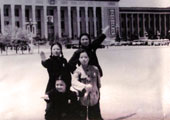
Meanwhile, more players are trying to get a slice of the big market.
Costa Coffee, from the United Kingdom, also has ambitious plans in China. It intends to have 500 cafes in the country by 2016. Hong Kong-based coffee chain Pacific Coffee also said earlier that it aimed to expand and overtake Starbucks in the mainland.
"We respect and embrace positive competition and what it brings to the market. The Starbucks experience is unique and offers something that no one else can deliver - the highest quality products, exceptional coffee knowledge, innovation and engaging baristas in a welcoming environment," Culver said, as he stressed the importance of a "direct emotional connection with customers".
"As we evolve and grow in China we are also creating that emotional connection with our customers in the digital space and rewarding them through programs such as My Starbucks Rewards. We know that we must continue to innovate and exceed customer expectations to maintain a leadership position," he said.
As for price, Starbucks is never advantaged in providing cheaper products. Culver said he does not think the company's products are "overpriced" in the China market, as some Chinese reports have said.
Starbucks evaluates pricing around the world differently, he said.
Coffee penetration or market penetration in China is very, very different, he said. In the US, for example, Starbucks' business peak is breakfast time. In China, most customers come in the afternoon and use the coffee house social destination to connect with their friends.
Since consumer behavior is very different, the way the company opens its stores, for example, choosing the location is very different, Culver said.
He made it clear there is no plan to raise prices at the moment.
"Starbucks is committed to presenting an authentic coffee experience," Culver said. However, he stressed the company is also trying to make the beverages relevant to the local community.
It has set up a research and development center in Shanghai to innovate new products that meet local customers' needs, such as introducing several kinds of teas into menus.
It has also begun to source coffee beans grown in China. Last November, Starbucks set up a joint venture in Pu'er county, Yunnan province, and opened its first Farmer Support Center in Asia to help improve the quality of local coffee beans and make Pu'er a stable sourcing region.
"The opening of the Starbucks China Farmer Support Center was a milestone in Starbucks' continued investment in China and the Starbucks Yunnan Coffee Project," Culver said, adding that Starbucks believes Yunnan will one day play an important strategic role in the long-term supply of premium Arabica coffee.

















 Employees run half-naked for not meeting sales quotas
Employees run half-naked for not meeting sales quotas


![]()
